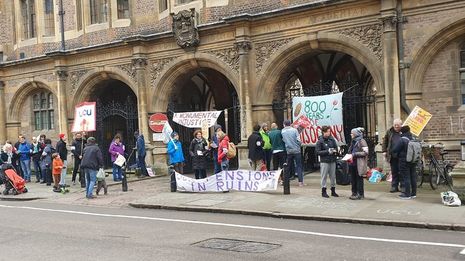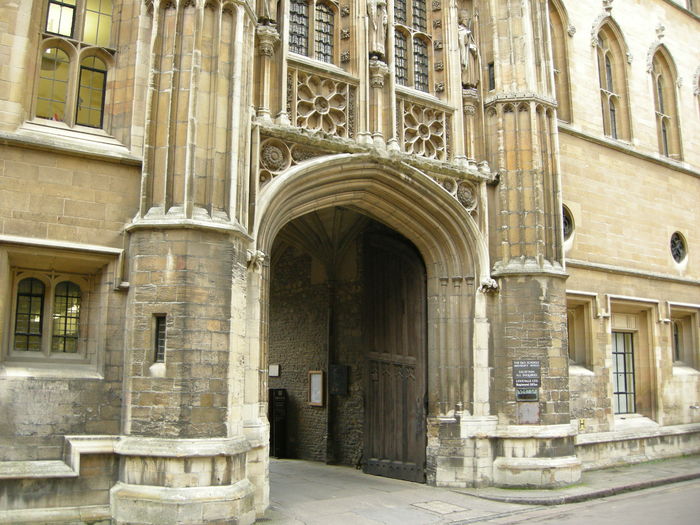Students have a right to be angry, but these strikes are a battle for the future
With the higher education system in crisis and students rightfully angry, Ewan Hawkins argues that frustration should be directed at management, not workers

The higher education system is in crisis, and students should be angry. Two matters reflect this crisis the most poignantly – both of which the University and College Union (UCU) are taking strike action on.
The first relates to staff pensions, particularly recent changes to the USS scheme that would make a typical member £240,000 worse off over a lifetime. The second is the ‘four fights’ dispute: on pay, inequality, casualisation, and workloads. Staff workloads are augmenting, now averaging 53 hours week, and a proliferation of precarious contracts means that half of staff are working on a temporary basis, some lacking basic benefits such as sick pay. The supervision work we all benefit from is often the classic site for these employment practises. At the same time, workers have faced a 20% pay cut in a decade alongside massive gender, race, and disability pay gaps – the latter two of which Cambridge isn’t even gathering data on, let alone solving.
“Staff working conditions are students’ learning conditions.”
Students should be angry about this. Staff working conditions are students’ learning conditions; as long as staff are overworked, underpaid, precariously employed and discriminated against, our education will suffer. Many students dream of a career in academia but the reality is increasingly a nightmare of overwork and exploitation; when we fight for staff working conditions, we are often fighting for our own future. Third year students will have lost 36 days of teaching time because the managers of the University system have failed to respond to the most basic of demands made of them by their staff.
It’s clear who is responsible for these crises and where we should direct our anger. On a national level, it is the managers of higher education working in concert with the Government to turn education into a commodity. Cambridge colleges played a key role in pushing for University’s UK (UUK) pension cuts and the Vice-Chancellor refused to reveal whether Cambridge contributed to further strikes this week.
Unsurprisingly, it is those responsible for it who are simultaneously benefiting from the marketisation of education. While junior staff and other workers are overworked and underpaid, having to forego sick pay, Vice-Chancellor Stephen Toope earns £475,000 a year (up £132,000 from 2017).
Major progress has been made in the past two years showing that collective, trade union action backed up by a creative student movement can – and will – win. UUK – the employers’ negotiating body in the USS pensions dispute – was forced to freeze the 2018 cuts and form a Joint Expert Panel to reconsider valuations which has issued two reports vindicating the striking workers. Workers’ and students’ chants of “What do we want? Fair pensions! How do we get them? Strike strike strike!” were proved right.
“Cambridge has the power to end the dispute, and to prevent the disruption that strike action causes to its students.”
The strike action last term forced massive concessions from the Universities and Colleges Employers’ Association. From these strikes emerged national ‘expectations’ on casualisation, workloads, and inequality. But since there was no pay offer and no formal mechanisms exist to enforce them, these expectations – already in need of strengthening – would never have become a reality without further strike action.
The 2018 strikes showed that the management of the University of Cambridge can be forced to take action and to end the strikes. The combination of strikes, a student occupation of the Old Schools, and other forms of creative disruption forced the University to make a number of concessions, including reversing policies to push for the de-risking of the USS scheme and the rescheduling teaching without compensation.
Under this united pressure, Stephen Toope was also forced to come out publicly against the fundamental error of University marketisation with a public statement and letter to The Times, and to attend an open meeting where staff and students were given an unprecedented opportunity to hold him to account face to face.
At the start of this round of strikes, Cambridge UCU announced a major victory after the HR committee agreed to consider the transfer of hourly paid teachers to employment contracts, as well as a review of 700 fixed-term contracts in roles of an ongoing nature.
Cambridge UCU ask for three things from University management. The first is for union recognition: Cambridge is one of only seven higher education institutions in the UK not to formally recognize its academic staff union. The second and third are for public statements calling on national employers’ bodies UUK and UCEA to meet UCU’s demands, and setting out the University of Cambridge’s own plans to meet the national demands respectively. These three simple commitments from the University would resolve the current dispute, and provide a path toward the end of strike action.
The University has the power to end the dispute, and to prevent the disruption that strike action causes to its students. Instead, management attempts to divide and conquer, driving a wedge between students and staff, hoping that students’ anger will be directed at striking staff rather than at the overpaid few in charge who have so far refused to take any steps towards a resolution.
The power and the responsibility to end these disputes and resolve these strikes lies in the hands of management, and management alone. When we stand together, students and workers united and fighting, we can force their hand. Stephen Toope, can you hear us? We’re getting louder by the hour.
 News / Colleges charge different rents for the same Castle Street accommodation2 March 2026
News / Colleges charge different rents for the same Castle Street accommodation2 March 2026 News / News in Brief: waterworks, wine woes, and workplace wins 1 March 2026
News / News in Brief: waterworks, wine woes, and workplace wins 1 March 2026 News / Climate activists protest for ‘ethical careers policy’1 March 2026
News / Climate activists protest for ‘ethical careers policy’1 March 2026 News / Angela Merkel among Cambridge honorary degree nominees27 February 2026
News / Angela Merkel among Cambridge honorary degree nominees27 February 2026 News / Private school teacher who lied about Cambridge degree barred from teaching27 February 2026
News / Private school teacher who lied about Cambridge degree barred from teaching27 February 2026









